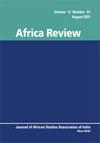萨赫勒地区牧民和牧地的过去、现在和未来
IF 0.5
Q4 AREA STUDIES
引用次数: 0
摘要
这篇论文从萨赫勒地区气候变化和粮食不安全的流行叙述开始,描绘了一段关于牧民及其生活方式如何被处理自然资源公地主题的外部学者所理解的简短历史。这将导致对经济学家、历史学家和学者所阐述的共同/s的生产性政治潜力的多种理解进行更深入的分析,并探索这些理论对萨赫勒地区的影响。这包括管理公地的各种政府政策,从开放获取到以牧场为基础的系统,以及资本主义行为者对公地的私有化或剥削。本文进一步探讨了改善该地区治理的三个设计原则,即流动性、包容性和冲突调解,最后对追求增长率的绿色主义提出了警告,同时也对警惕和赋权的牧民的形象提出了希望。本文章由计算机程序翻译,如有差异,请以英文原文为准。
The Past, Present and Future of Pastoralists and the Pastoral Commons in the Sahel
The paper begins with popular narratives on climate change and food insecurity in the Sahel, painting a brief history of how pastoralists and their lifestyles have been understood by external scholars dealing with the theme of natural resource commons. This leads into a deeper analysis of multiple understandings of the productive political potential of the common/s as articulated by economists, historians and academics, and an exploration of the implications of these theories for the Sahel. This includes various government policies managing the commons, ranging from open-access to ranch-based systems, and the privatisation or exploitation of the commons by capitalist actors. The paper further explores three design principles, namely, mobility, inclusion and conflict mediation, for better governance in the region, and ends with a note of caution against the green-washed pursuit of growth rates, tempered by a note of hope in the figure of the vigilant and empowered pastoralist.
求助全文
通过发布文献求助,成功后即可免费获取论文全文。
去求助
来源期刊

Africa Review
AREA STUDIES-
CiteScore
1.80
自引率
12.50%
发文量
22
期刊介绍:
Africa Review is an interdisciplinary academic journal of the African Studies Association of India (ASA India) and focuses on theoretical, historical, literary and developmental enquiries related to African affairs. The central aim of the journal is to promote a scholarly understanding of developments and change in Africa, publishing both original scholarship on developments in individual countries as well as comparative analyses examining the wider region. The journal serves the full spectrum of social science disciplinary communities, including anthropology, archaeology, history, law, sociology, demography, development studies, economics, education, gender studies, industrial relations, literature, politics and urban studies.
 求助内容:
求助内容: 应助结果提醒方式:
应助结果提醒方式:


